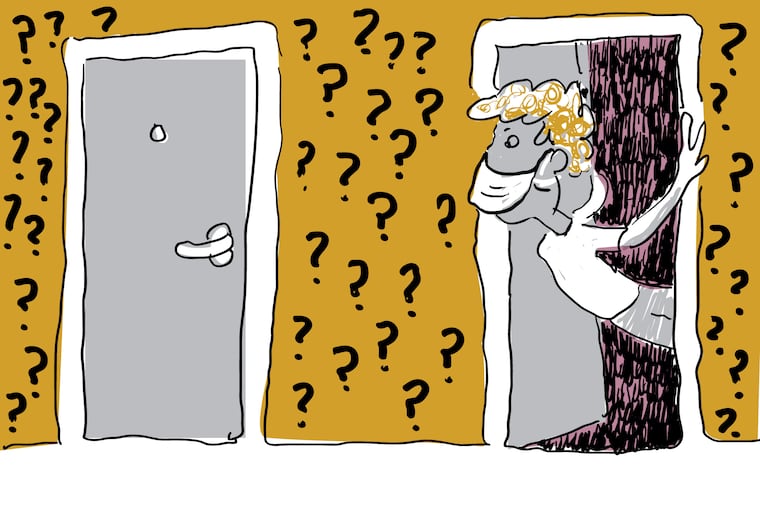Things to do (from home) this week: Welcome to the yellow phase
This week, we’ve got important self-care advice for black Americans right now, and how everyone else can help out too. And we also have answers about what the yellow phase means.

This has been one of the most challenging, painful weeks in recent years. On top of coronavirus ravaging our communities and keeping us isolated, protests fueled by anger and sorrow have gripped our region. It can be hard to know what to do — whether its helping your neighbors or yourself. But we have important advice: How black Americans can practice self-care during these trying times, and how everyone else can help them.
It might also help all our moods to know that we are going yellow this weekend, and we have answers about what that means. But before we get there:
We’ve got the best online events this week, including virtual graduations, the Roots on YouTube, a Lin-Manuel Miranda doc and more: inquirer.com/calendar. And our kids calendar is updated every Sunday with ways to keep the kids occupied while you work: inquirer.com/kidscalendar.
How to do (everything) better: Everything you need to know about living right now is all here in one place: inquirer.com/topic/do-this
Stay healthy, stay safe, and, as much as possible, it’s still a good idea to stay home.
Your yellow phase questions, answered
What will our social lives look like in the yellow phase? by Elizabeth Wellington
What’s allowed to be open in the yellow phase? by Jonathan Lai and Garland Potts
What are kids allowed to do in the yellow phase? by Elizabeth Wellington
How does the state decide when to move a county to the next phase? by Jonathan Lai
Can I drive to a county in the green phase to get a haircut? by Elizabeth Wellington
Can I see my parents in the yellow phase? by Grace Dickinson
How can I deal with my anxiety about the next phase? by Elizabeth Wellington
» SEARCH OUR FAQ: Your coronavirus questions, answered
Support this
The past week has seen a huge amount of pain and turmoil in this city. The protests come after George Floyd’s death after a Minneapolis police officer choked him by kneeling on his neck. For many, this has been a time of real trauma. “We are on the brink of a fiery change, yes. But it’s a lot,” writes Elizabeth Wellington. Here are some ways for black people to cope with it all, and ways for allies to help:
Know this is a unique time in history. This comes in the middle of another crisis, the coronavirus, which is also killing black people at disproportionate rates.
Allies: Show empathy. Tell your black friend that while you can’t understand all they are going through, you know it’s real and you stand with them
Don’t apologize for being angry. “We are taught from an early age that not only will we be subjected to racism, bias acts, and police brutality, but that we should get used to it,” says Richard Orbé-Austin, a New York-based psychologist and black man.
Allies: Remind your white friends and family of the reasons behind the protests. Instead of pointing to the looting, a better question to ask is: How did we get here?
Spend time away from social media. The images of Floyd taking his last breaths are seared in our minds. But “seeing it happen over and over again causes a primary response trauma because we relate so deeply to the victim," said Zakia Williams, co-founder of the Philadelphia-based non-profit, Black Men Heal. Reliving it over and over again is unhealthy.
Allies: You may not want to watch the videos over and over again either, because those empathetic to the cause will be as equally jarred. But these videos can be useful to point out that racism exists to those in your life who try to explain it away.
There are many, many more tips in Elizabeth’s full piece.
» READ MORE: How black Americans can practice self-care during these trying times. And how everyone else can help them.
» READ MORE: How to talk to your kids about racism and the protests
Cool this
It is hot in Philadelphia. And the summer’s heat is starting to really show itself. If you don’t have air conditioning, it’s going to be a hard summer. And making it worse: Many of the places where we have usually been able to go for refuge will not be open, at least not for a while. Nick Vadala tracked down some tactics for staying cool, friends. Here are some of them:
Use fans wisely. Fans can be one of the best ways to keep cool — but there are right and wrong ways to use them. For example, never use a fan with your windows closed, which can create an “oven effect” by circulating hot air.
Fans can be more effective at night when you can open your windows to allow the cool night air in.
If your home has ceiling fans, make sure the blades are rotating counterclockwise. That way, the fan will push air down into your space to create a breeze.
And, if you want to buy an air conditioner, make sure you get one that is appropriately sized for the room you are trying to cool. If it’s too small, it will have trouble; if it’s too big, it will leave too much moisture behind. A good rule of thumb: get 20 BTUs (British Thermal Units) of cooling power for every square foot of space.
Nick has many more tips for staying cool in the full story. And, if you’re still warm, can we just recommend these recipes for homemade water ice?
» READ MORE: How to stay cool without air conditioning in Philly